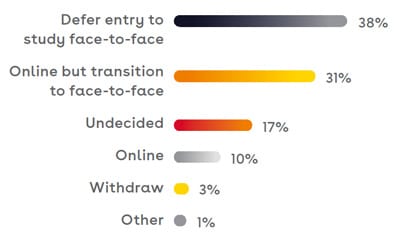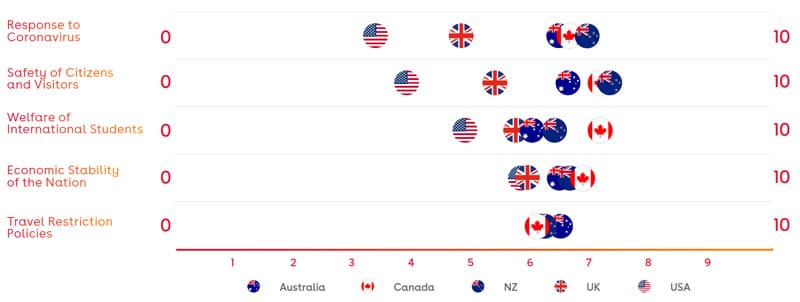New insights on how international students are planning for the coming academic year
- Most international students still want to study abroad, but there is a strong preference for in-person instruction rather than online methods of content delivery
- Four in ten students would wait 3–6 months to begin in-person classes, while 27% said they weren’t sure how long they could wait
- Overall, more than half were willing to defer up to 12 months before changing their plans or exploring other study options
A new global survey reinforces the findings of other recent student research in that a large majority of international students who have had their academic dreams interrupted by COVID-19 still plan to study abroad. The IDP Connect study explored the COVID-19-oriented perceptions and motivations of nearly 6,900 international students with offers from universities in Australia, Canada, New Zealand, the United Kingdom, and United States. It is the latest in a series of surveys tracking how international students are now approaching planning for study abroad.
Seven in ten (69%) respondents to the IDP survey still intend to begin studies “as planned,” a proportion more than twice as large as that of students who “don’t know” (26%). Only 5% of students said they no longer intended to follow through on their plans.
The finding will be extremely welcome to educators wondering whether COVID-19’s travel restrictions and other impacts might already be dampening demand among international students.

But other findings add nuance to the story; as IDP Connect CEO, Simon Emmett, says, they reveal that there’s only a short window of time left to keep students’ hopes and plans intact. That’s because there’s limited appetite for beginning studies online with the hopes of eventually travelling to a physical campus: 31% said they would, while 38% said they would rather defer their start date to be able to study face-to-face (i.e., with no online component). The proportion of postgraduates preferring to defer entry was significantly larger than it was among undergraduates.
Hopes pinned on September entry
Of students who indicated that they would prefer to defer rather than begin their studies online, more than a quarter (27%) weren’t sure how long their patience would last. Another 23% said they could wait up to six months to begin their programme, and 18% said they’d wait up to three months – the same percentage as those who said they could wait “until the institution was ready.”
As Mr Emmett notes, interest in study abroad wanes with the prospect of having to wait several months to begin in-person studies:
“More than half of all students (54 percent) were only willing to defer up to 12 months or less before changing their plans or exploring other study options. This creates a narrow opportunity for destination markets and institutions who rely on September intake.”
International experience still key
Being on campus in a foreign destination with the ability to meet friends and network with potential employers is a major driver of international students’ desire to study abroad. This is underlined by the responses to a question about top concerns related to online study:
- 69% said their major concern with online learning vs. in-person learning is that it lacks the international exposure they were hoping to gain;
- 47% said it was a concern about teaching quality;
- 40% said it had to do with their personal learning style.
Quite simply, most international students want to travel for study, and have limited appetite for studies online.
Rating destinations
Survey respondents were also asked about their perceptions of major study destinations during the crisis. On a scale of “0” to “10,” Canada, New Zealand, and Australia came out ahead of the US and UK in terms of how students view these countries’ response to COVID-19, how safe they appear to be, how economically stable they seem, and how much they are attending to the welfare of international students.

The survey’s exploration of destination preferences is also interesting in terms of how the competitive dynamic among destinations could shift as the pandemic runs its course. Given the strong underlying demand for in-person instruction, for example, destinations that are seen to have a stronger public health response, and that are able to move more quickly to open borders and campuses, will likely earn greater market share by attracting students who had originally intended to study elsewhere.
Commenting on the survey results, Mr Emmett concluded,
“While it is positive there is still strong demand, there is more work to be done. If destination countries and institutions are to meet this demand, governments, community services and the international education sector will need to come together to find solutions that enable students to arrive in-country and commence face-to-face studies soon.”
For additional background, please see:
















